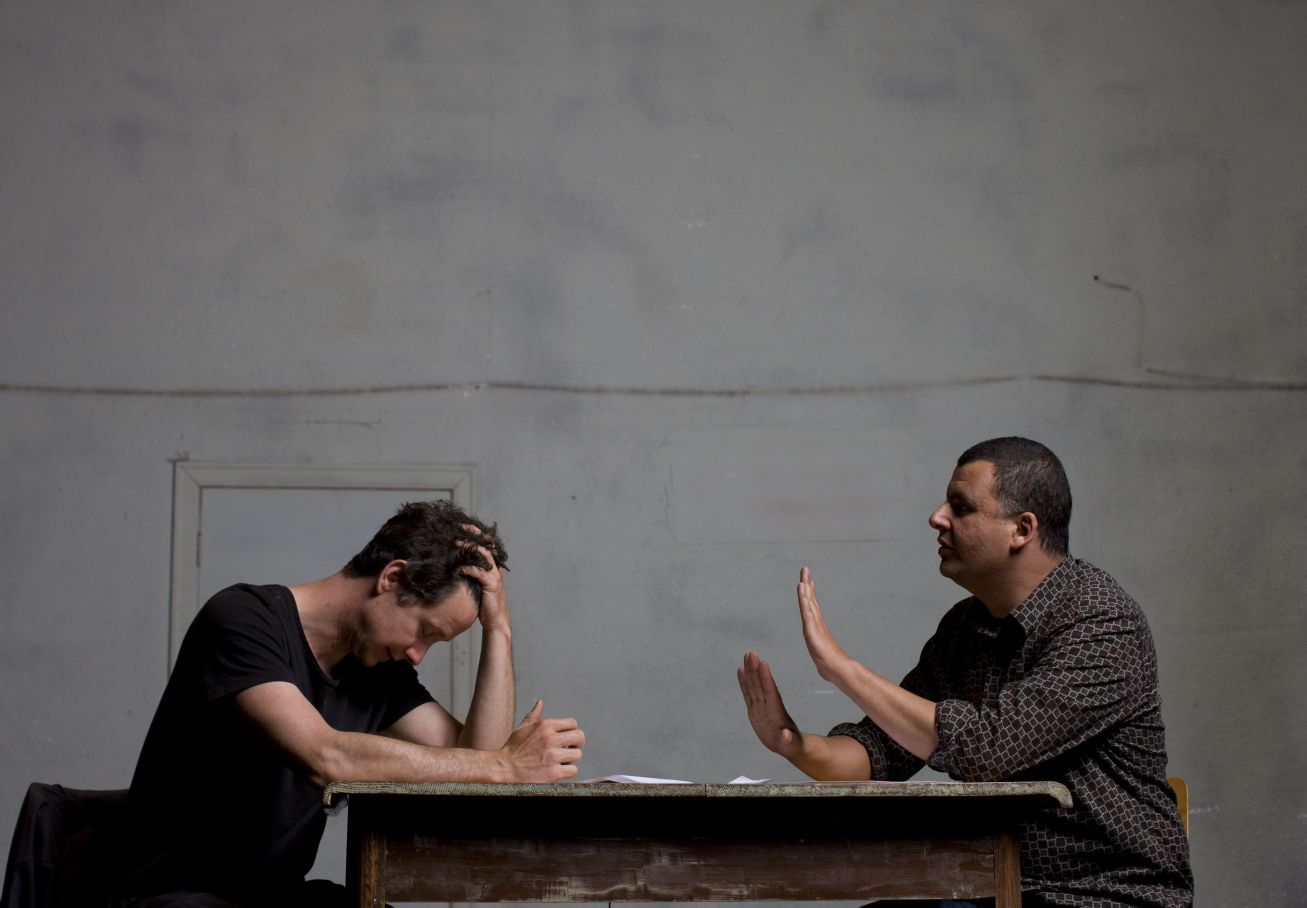
Photo courtesy of Woolly Mammoth Theatre.
As a critic, whether of music, film or theater, I aim to write about the definitive experience, not just mine. But there was something personal about Winners and Losers. It had a quality that haunted me while simultaneously leaving me unsure of its effect on the rest of the theater. It was a play, but it wasn’t meant to be watched. After all, the minimalist set didn’t offer much for the eye. It was meant to be felt, and the 100 sobered theatergoers who left that night were its quiet triumph.
James Long, or Jamie as he’s known to the audience, and Marcus Youssef are the writers and only actors of the 90-minute production. A table, two chairs and some beers are their co-stars. It starts off innocently enough. The two pals banter about anything that comes to mind, often classifying things as winners or losers. Mexico? Loser. Internet privacy? Winner. Even some local topics get thrown in the mix. (Union Station? Definitely a winner.)
The show mixes improv and scripted jokes, giving the sense that anything could happen and that the script varies from night to night.
A question for Stephen Hawking: “What would you prefer in your life, Stephen, your legacy or your legs?”
Twenty-five minutes in, they stand to talk about their lives, wives and houses. While it’s a desperately needed breath of air amid the table talk, it’s a cue that the show might be a little more rehearsed than it seems.
The mood is light. The friends crack jokes, even as the topics turn personal.
“I left home when I was 16,” Jamie announces.
“I left home when I was 15,” Marcus one-ups him.
“Yeah,” Jamie says. “But you went to a boarding school.”
They return to their chairs and start something in the vein of a theater game. Then, during an obviously scripted pingpong match, things start to heat up.
Perhaps the most miraculous thing about Winners and Losers is its subtlety. It’s slow at first, almost boring, and by the end, it’s clear you feel downright weird. How does it happen? That’s a winning question. Gradually, the topic of family is introduced and the tone shifts.
Marcus comes from a wealthy home. His dad was an Egyptian immigrant who made it in America. And yet, Marcus feels sad. His father can only express his love through money.
And on the other end of the spectrum is Jamie. His father was mean and cold, and Jamie resents his childhood. After years of suffering, he struggles to manage the anger and emotional toll of his youth, especially when it comes to dealing with his own kids.
The friends initially respect one another’s backgrounds and don’t dwell too long on them. Instead, they start naming arbitrary things to categorize.
Baywatch? Winner.
Germany? Winner.
Italy? Loser.
Juicy Fruit? Winner.
Big Red? Loser.
Washington Monument? Loser — too phallic.
And then: “Me?” Jamie asks.
The jokes stop. The smiles fade. Friendly competition runs off the stage. Jamie and Marcus slowly begin to pick each other apart. Jamie says Marcus always wants to be a victim even though nothing bad has happened to him. Marcus says Jamie is so hardened he’ll never show sympathy for anyone.
The cuts get deeper, the blows harder. Marcus says maybe Jamie isn’t fit to be a father. Along for the ride, the audience can’t look away. The cruelty is captivating. It becomes clear why there was no set or plot beyond the two men and their words. As the argument escalates, words become everything. Neither man gains the upper hand, but the fight seems raw and genuine.
When it all ends, the audience is left to wonder what they just witnessed. How much of the personal lives of those two characters was real? Will the show really be different tomorrow? The lights come up and the murmur of questions floats through the air, leaving the audience to drift out of the theater, dazed.
Winners and Losers is at Woolly Mammoth Theater until Nov. 22.



